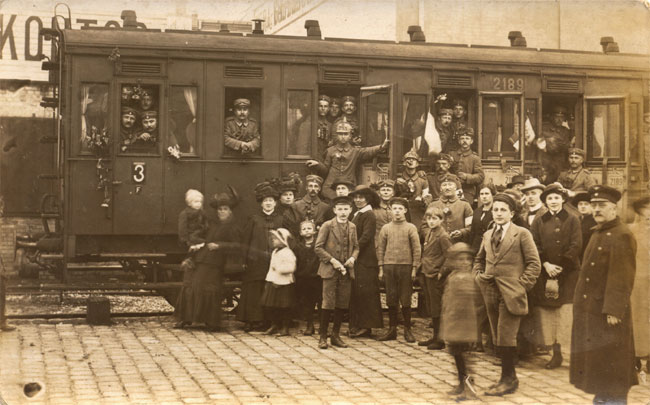Alfred von Heygendorff was born at Bad Elster on 1 March 1868 into minor nobility. His great-grandmother was the distinguished tragedienne and opera singer Karoline Jagemann, who had been granted her estate and title of Freifrau von Heygendorff as mistress to his great-grandfather Carl August, reigning duke (herzog, from 1815 grossherzog) of Saxe-Weimar-Eisenach. Like its neighbour Saxe-Coburg and Gotha (famously the home of Queen Victoria's consort Prince Albert) this small Thuringian duchy was ruled by a branch of the Ernestine line of the royal house of Wettin. The rival (and originally junior) Albertine line provided the electors and (from 1806) kings of Saxony, to whom the von Heygendorffs are thus also related.

Alfred's grandfather Karl pursued a career in the Royal Saxon Army and settled in Dresden, ultimately reaching the rank of Generalmajor and retiring before the wars of 1866-71. Alfred's father Bernhard and uncle Alfred both followed Karl into Saxon military service. Bernhard ended his career as an Oberst of Gendarmerie (police) and died peacefully in 1916.
Thus the young Alfred von Heygendorff was destined to be an officer, and would be the first (but by no means the last) of his name to serve in war. From the age of six he was privately tutored at home, and accepted into the prestigious Königliche Gymnasium in Dresden at the age of ten in 1878. After several years of further study at the Großherzogliche Gymnasium in Weimar, Alfred received his Abitur (graduation certificate) and joined Kgl. Sächs. 1. (Leib-)Grenadier-Regiment Nr.100 (LGR 100 - the Saxon infantry life guards) as a Fahnenjunker in March 1887. He received his officer's commission as a Leutnant the following year.
From 1892 to 1894 he was seconded to the Kgl. Sächs. Kadettenkorps, a jealously guarded bastion of Saxon military particularism regarded with considerable suspicion by the Prussian chauvinist press (not least for the presence of many Hannoverian military families who refused to serve directly under the Prussians). While serving there - presumably as an instructor - he was promoted to Oberleutnant in 1893. In May 1894 Alfred married Elsa von Wittern, herself daughter of a Saxon Oberst. They settled in Dresden, producing a daughter (Wera) and two sons (Egon and Ralph) - both of whom in turn became officers with LGR 100.
Evidently Alfred was held in high esteem and personal trust by the Saxon royal family, for from 1898 he served for three years as personal adjutant to Prince Friedrich August, son of King Albert's brother Prince Georg. In June 1902 Albert died childless and was succeeded by Georg, making Friedrich August the crown prince. Following the death of King Georg in October 1904, his son then succeeded him as King Friedrich August III - and Alfred von Heygendorff found himself a friend of the reigning monarch.
At the end of his royal adjutant's appointment in 1901 Alfred was assigned to Kgl. Sächs. 2. Grenadier-Regiment Kaiser Wilhelm, König von Preußen Nr. 101 (GR 101) as a company commander and promoted to Hauptmann. He reached his final pre-war rank in 1911 as Major on the regimental staff. In 1913 he was appointed as a battalion commander in the likewise Dresden-based Kgl. Sächs. 12. Infanterie-Regiment Nr.177 (IR 177 - part of 32. Infanterie-Division), with which he went to war the following summer.

While lying in the firing line with his men at Perthes in the Champagne on 1st September 1914, Major von Heygendorff was wounded by a shrapnel ball and had to cede command of the battalion, but insisted on remaining with IR 177 in the field. Due to heavy officer losses he reported fit for duty again a few days later, although his wound was not healed and had to be freshly bandaged every day. On 2nd October he was given acting command of Kgl. Sächs. 13. Infanterie-Regiment Nr.178 (IR 178 - part of 23. Infanterie-Division), which was down to a strength of two companies. The regiment was refilled with replacements a few days later and Alfred appointed as one of its battalion commanders. On 22nd October he was awarded the Iron Cross 1st Class.
- Prev
- Next >>





